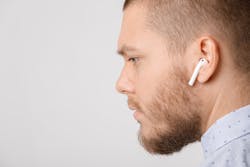The use of earbuds and similar devices to listen to music, books and podcasts, and conduct phone conversations has grown rapidly in recent years – particularly among millennials and post-millennials. For example, wireless AirPods now seem to be everywhere.
The concern for employers with these devices, particularly in safety-sensitive industries like manufacturing, is how occupational safety is impacted by their use—and could the Occupational Safety and Health Administration (OSHA) even regard their use in a manufacturing environment to be illegal?
OSHA has issued no rules specifically regulating the use of earbuds or similar devices in the workplace. Yet the U.S. Department of Labor, in 2011 rulemaking, explicitly recognized that “workers of all ages [working with dangerous equipment] are at risk when … using earphones or ear buds to listen to electronic devices.” Additionally, in that rulemaking, the DOL expressed concerns that these devices make it “very hard” to hear emergency alerts and difficult for workers to remain “aware of their surroundings” and “maintain an appropriate level of safety consciousness.”
While not adopting binding regulations for earbud use in the workplace, OSHA has issued guidance that should give any responsible employer pause when considering permitting their use in a manufacturing facility or other safety-sensitive environment.
Some History
OSHA’s consideration of hazards associated with these types of devices began in the 1980s with the burgeoning popularity of the Sony Walkman. In a 1987 letter, OSHA directed that the use of earphones constituted a violation of OSHA hearing protection standards when:
1. Noise is at levels requiring hearing protection – 85 decibels or more for an eight-hour day
2. Earphones are worn over hearing protection devices.
Very significantly, OSHA also instructed that allowing the use of such devices when hearing protection is not otherwise required is up to management’s discretion, unless its use causes a serious safety hazard, under the general duty clause of the OSHA Act. That clause requires an employer to act reasonably to maintain a safe work environment for its employees, even when OSHA has not promulgated a specific safety standard regarding the hazard at issue.
Setting Ground Rules
There is no doubt that OSHA recognizes that in some work environments, the wearing of audio devices potentially could place the employee in serious danger.
For instance, in considering vehicle and other equipment backup risks, OSHA has directed in its guidance that workers should “[n]ever wear earbuds or headphones” when working near vehicles or equipment.
Of course, in the manufacturing setting, even with employees who are not directly operating heavy equipment, there is almost always energized equipment located somewhere nearby, such as conveyors and forklifts.
Further, in manufacturing settings, there are commonly dangerous energy-related hazards such as electrical, heat, chemical, or fire hazards where audible warnings may be of critical importance such as in the case of malfunctioning equipment or an evacuation.
Given these risks and the federal government’s guidance, a manufacturing employer would be well advised to adopt the following measures. (That said, keep in mind that in a unionized environment, employers may be required to negotiate with the union on earbud use.)
1. All employees in any operational area of a manufacturing facility, including even employees who work in warehousing or supply areas, should be prohibited from using earbuds or similar items.
2. Those individuals who work strictly in an office setting, well away from any operational sectors of the facility may use earbuds—but even in that setting, they should be prohibited from using the devices while walking or otherwise leaving their desk.
3. Employees must be prohibited from using these devices in place of required hearing protection.
4. Employees must be prohibited from wearing these devices under, or over, hearing protection.
5. Further, even without earbuds, workers must not be on their smartphones while performing work or near any operating equipment. When using phones, they must be well clear of any transit paths for vehicles, forklifts, bicycles or even walkways for pedestrians in the plant.
One more piece of advice: Never permit earbud or cellphone use on a trial basis. Experience teaches us that once employees in a particular setting are allowed to use these devices, taking away that privilege creates very difficult employee relations challenges.
Bob Nichols is a partner in Bracewell LLP’s Houston office. Bob has over 29 years of experience in employment law, having represented employers in litigation, administrative investigations, and other actions related to employment including the defense of claims of alleged discrimination, retaliation, harassment, wrongful discharge, and occupational safety and health violations. Caroline Melo is an associate at Bracewell, providing advice and counsel to employers regarding a variety of workplace matters.
About the Author
Robert S. Nichols
Partner, Bracewell LLP
Bob Nichols is a partner in Bracewell LLP’s Houston office. Bob has over 29 years of experience in employment law, having represented employers in litigation, administrative investigations, and other actions related to employment including the defense of claims of alleged discrimination, retaliation, harassment, wrongful discharge, and occupational safety and health violations.
